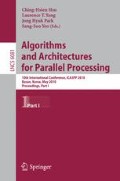Abstract
In this paper we report on the recent progress in computing bivariate polynomial resultants on Graphics Processing Units (GPU). Given two polynomials in ℤ[x,y], our algorithm first maps the polynomials to a prime field. Then, each modular image is processed individually. The GPU evaluates the polynomials at a number of points and computes univariate modular resultants in parallel. The remaining “combine” stage of the algorithm is executed sequentially on the host machine. Porting this stage to the graphics hardware is an object of ongoing research. Our algorithm is based on an efficient modular arithmetic from [1]. With the theory of displacement structure we have been able to parallelize the resultant algorithm up to a very fine scale suitable for realization on the GPU. Our benchmarks show a substantial speed-up over a host-based resultant algorithm [2] from CGAL ( www.cgal.org ).
Access this chapter
Tax calculation will be finalised at checkout
Purchases are for personal use only
Preview
Unable to display preview. Download preview PDF.
References
Emeliyanenko, P.: Efficient multiplication of polynomials on graphics hardware. In: Dou, Y., Gruber, R., Joller, J.M. (eds.) APPT 2009. LNCS, vol. 5737, pp. 134–149. Springer, Heidelberg (2009)
Hemmer, M.: Polynomials, CGAL - Computational Geometry Algorithms Library, release 3.4. CGAL, Campus E1 4, 66123 Saarbrücken, Germany (January 2009)
Collins, G.E.: The calculation of multivariate polynomial resultants. In: SYMSAC 1971, pp. 212–222. ACM, New York (1971)
Bubeck, T., Hiller, M., Küchlin, W., Rosenstiel, W.: Distributed Symbolic Computation with DTS. In: IRREGULAR 1995, pp. 231–248. Springer, London (1995)
Schreiner, W.: Developing a distributed system for algebraic geometry. In: EURO-CM-PAR 1999, pp. 137–146. Civil-Comp Press (1999)
Hong, H., Loidl, H.W.: Parallel computation of modular multivariate polynomial resultants on a shared memory machine. In: Buchberger, B., Volkert, J. (eds.) CONPAR 1994 and VAPP 1994. LNCS, vol. 854, pp. 325–336. Springer, Heidelberg (1994)
Geddes, K., Czapor, S., Labahn, G.: Algorithms for computer algebra. Kluwer Academic Publishers, Dordrecht (1992)
Kailath, T., Ali, S.: Displacement structure: theory and applications. SIAM Review 37, 297–386 (1995)
Frantzeskakis, E., Liu, K.: A class of square root and division free algorithms and architectures for QRD-based adaptive signal processing. IEEE Transactions on Signal Processing 42, 2455–2469 (1994)
Szerwinski, R., Güneysu, T.: Exploiting the Power of GPUs for Asymmetric Cryptography. In: Oswald, E., Rohatgi, P. (eds.) CHES 2008. LNCS, vol. 5154, pp. 79–99. Springer, Heidelberg (2008)
Harrison, O., Waldron, J.: Efficient acceleration of asymmetric cryptography on graphics hardware. In: Preneel, B. (ed.) AFRICACRYPT 2009. LNCS, vol. 5580, pp. 350–367. Springer, Heidelberg (2009)
NVIDIA: CUDA Compute Unified Device Architecture. NVIDIA Corp. (2007)
Chandrasekaran, S., Sayed, A.H.: A Fast Stable Solver for Nonsymmetric Toeplitz and Quasi-Toeplitz Systems of Linear Equations. SIAM J. Matrix Anal. Appl. 19, 107–139 (1998)
Monagan, M.: Probabilistic algorithms for computing resultants. In: ISSAC 2005, pp. 245–252. ACM, New York (2005)
Llovet, J., Martínez, R., Jaén, J.A.: Linear recurring sequences for computing the resultant of multivariate polynomials. J. Comput. Appl. Math. 49(1-3), 145–152 (1993)
de Dormale, G., Bulens, P., Quisquater, J.J.: An improved Montgomery modular inversion targeted for efficient implementation on FPGA. In: IEEE International Conference on FPT 2004, pp. 441–444 (2004)
Savas, E., Koc, C.: The montgomery modular inverse-revisited. IEEE Transactions on Computers 49(7), 763–766 (2000)
Hecker, C.: Let’s get to the (floating) point. Game Developer Magazine, 19–24 (1996)
Hillis, W.D., Steele Jr., G.L.: Data parallel algorithms. Commun. ACM 29, 1170–1183 (1986)
Author information
Authors and Affiliations
Editor information
Editors and Affiliations
Rights and permissions
Copyright information
© 2010 Springer-Verlag Berlin Heidelberg
About this paper
Cite this paper
Emeliyanenko, P. (2010). Modular Resultant Algorithm for Graphics Processors. In: Hsu, CH., Yang, L.T., Park, J.H., Yeo, SS. (eds) Algorithms and Architectures for Parallel Processing. ICA3PP 2010. Lecture Notes in Computer Science, vol 6081. Springer, Berlin, Heidelberg. https://doi.org/10.1007/978-3-642-13119-6_37
Download citation
DOI: https://doi.org/10.1007/978-3-642-13119-6_37
Publisher Name: Springer, Berlin, Heidelberg
Print ISBN: 978-3-642-13118-9
Online ISBN: 978-3-642-13119-6
eBook Packages: Computer ScienceComputer Science (R0)

